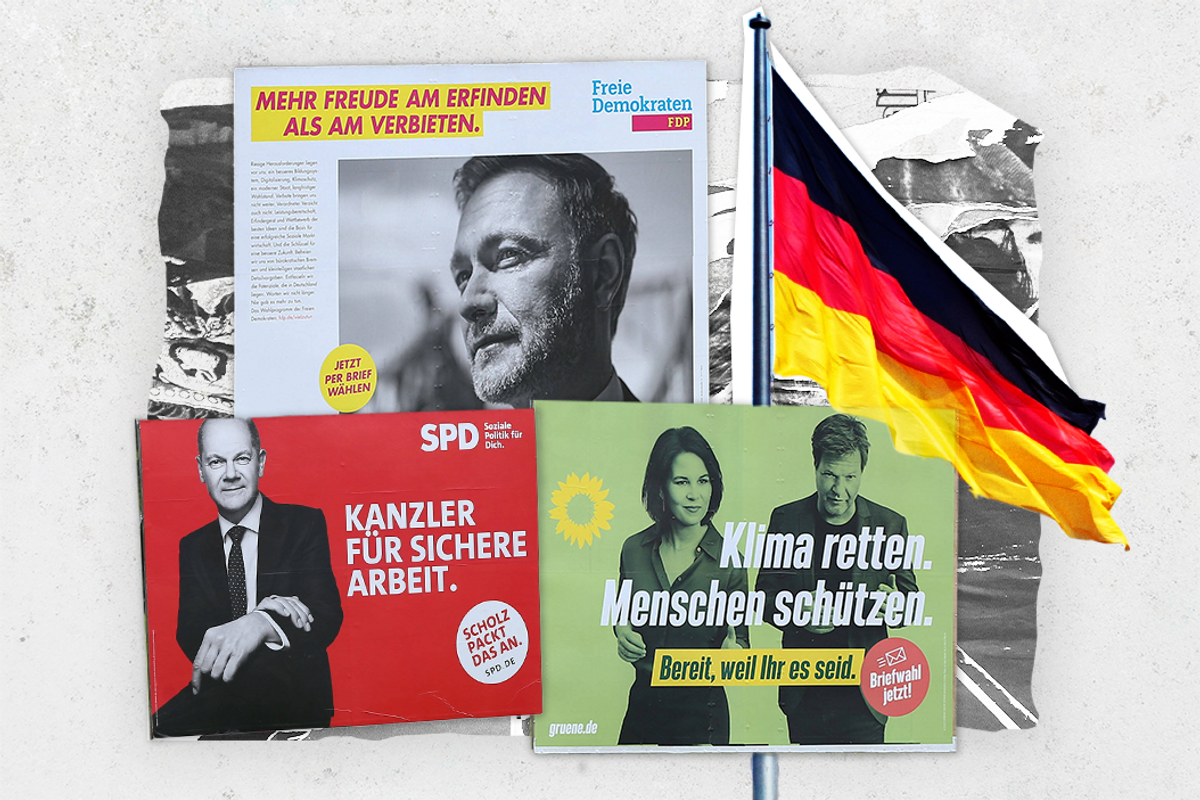The German people have spoken. For the first time in over 70 years, the country's next government is all but assured to be a three-way coalition.
That coalition will probably be led by the center-left SPD, the most voted party, with the Greens and the pro-business FDP as junior partners. Less likely but still possible is a similar combination headed by the conservative CDU/CSU, which got its worst result ever. A grand coalition of the SPD and the CDU/CSU — the two parties that have dominated German federal politics since World War II — is only a fallback option if talks fail badly.
Both the Greens and especially the FDP have been in coalition governments before. But this time it's different because together they have the upper hand in negotiations with the big parties wooing them.
The problem is that the two smaller parties agree on little beyond legalizing weed, and even when they do, diverge on how to reach common goals. So, where does each stand on what separates them?
Climate. The Greens, obviously, believe Germany needs to do a lot more to fight climate change, the most important issue for voters in this election. They want to phase out coal by 2030; for Germany to become carbon-neutral in 20 years; be able to veto laws that contradict the Paris Climate Accord; and invest 100 billion euros ($117 billion) in railways to get rid of most short-haul flights.
The Free Democrats, for their part, aim to tackle the climate crisis but without breaking the bank, prefer private to public spending, and mostly reject more business regulation. Instead, they prefer to decarbonize the German economy through more emissions trading, so companies that pollute less earn more, and pollution becomes very expensive for the rest.
Taxes. The Greens want to cut taxes for low earners, raise them for high earners, and have long pushed for a wealth tax on the richest Germans. The FDP, traditionally opposed to any tax hikes for any reason, softened its position during the election campaign, and now supports some tax relief for poor Germans as well as taxing rich Germans a bit more. But a wealth tax is a non-starter.
Debt. The Greens want to remove or revise Germany's so-called "debt brake" that caps annual public borrowing at 0.35 percent of GDP, enshrined in the constitution since 2009. The limit was suspended in 2020 for three years to allow the government to borrow more to spend on pandemic stimulus, but the Greens say it should be relaxed further to invest more in the country's future.
The FDP, meanwhile, will never agree to take the provision out of the constitution — which Scholz is also against — to protect future generations against profligate public spending and being saddled with repayments they can't afford. This time, however, the fiscal hawks seem willing to be a bit more flexible to boost investment in climate and digitalization.
European economic integration. The EU also suspended its fiscal rules — preventing member states from ever owing more than 60 percent of of their GDP — last year to allow member states to borrow more to deal with COVID, and approved a 750 billion euro COVID relief fund with everyone on the hook. The Greens want to keep it that way even in post-pandemic times because if all countries share the risk, more money will be available to all. Moreover, they believe low-debt Germany should give highly indebted countries like Italy or Spain more wiggle room to repay all the debt they took on because the pandemic hit them harder than the rest.
No way, say the Free Democrats, who like "frugal" EU countries such as the Netherlands insist the pandemic-era fiscal limits must be repealed ASAP: responsible Germans are tired of subsidizing nations that always borrow more than they should.
One thing that the Greens and the FDP do have in common, though, is their popularity among the German youth, with both parties leading among voters under 30. And that, coupled with the declining influence of the CDU/CSU and the SPD, means that the center of political gravity has shifted — five to six so-called "people's parties" and three-way coalitions are here to stay.- Europe after Merkel resigns - GZERO Media ›
- Angela Merkel's farewell song - Kraftwerk mix | PUPPET REGIME ... ›
- All German bets are off - GZERO Media ›
- Is Germany turning Green? - GZERO Media ›
- German election outcome begins new era of three-party cooperation - GZERO Media ›
- Germany's next government taking shape - GZERO Media ›






